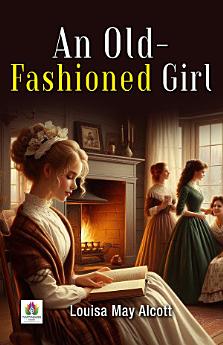An Old-Fashioned Girl
About this ebook
The plot follows Polly Milton, a sweet, honest, and unpretentious girl from a modest background, as she visits her wealthier friend, the Shaw family, in the bustling city. Polly, who embodies the virtues of hard work, sincerity, and simplicity, contrasts sharply with the more extravagant lifestyle of her affluent friends. Throughout the novel, she navigates the complexities of friendship, societal expectations, and her own aspirations while maintaining her values. Through her perspective, readers witness the challenges and choices that arise when differing social classes intersect.
One of the central themes of **An Old-Fashioned Girl** is the idea of authenticity and the importance of staying true to oneself. Polly, despite her modest means, remains grounded and unpretentious, valuing character and virtue above material wealth. Her genuine nature and ability to connect with others lead her to form meaningful relationships, both with the Shaw family and other characters she encounters. In contrast, characters like the shallow and self-absorbed relatives reveal the emptiness that can accompany wealth and status. Alcott effectively conveys that true worth comes from one’s character, not one’s social standing.
The novel also addresses the evolving role of women in society. Set against the backdrop of changing gender norms, Alcott explores the conflict between traditional expectations and the emerging desire for female independence. Polly serves as a role model for young women, showcasing that pursuing passions, education, and giving back to the community can be fulfilling and meaningful. Alcott subtly advocates for women’s rights and the need for young girls to be educated and empowered, allowing them to define their own paths away from societal constraints.
The character of Fanny Shaw, Polly’s friend, contrasts sharply with Polly’s values. Fanny is portrayed as more concerned with appearances and social status, embodying the pressures of high society. Through their friendship, Alcott highlights both the joys and challenges of navigating friendships that span different social classes. While Fanny initially represents the allure of wealth, Polly’s steadfastness ultimately leads Fanny to reflect on what truly matters in life, thereby depicting personal growth and transformation as key themes in the story.
Another noteworthy aspect of **An Old-Fashioned Girl** is Alcott’s vivid depiction of family dynamics and the importance of close-knit relationships. The Shaw family, while affluent, struggles with their own issues, reflecting not only the challenges of wealth but also the necessity of love and support among family members. Polly’s interactions with her own family highlight the comfort and strength that can be derived from supportive relationships. Through her exploration of family and friendship, Alcott emphasizes the importance of community and connection, showcasing how they contribute to one’s happiness and sense of belonging.
The novel is also rich with Alcott's trademark humor and wit, making the reading experience enjoyable and engaging. The author skillfully balances moments of seriousness with light-hearted episodes, ensuring that readers remain invested in the characters' journeys. The charming dialogues and relatable experiences of the characters resonate with audiences of all ages, making **An Old-Fashioned Girl** not only a product of its time but also a timeless coming-of-age tale.
In conclusion, **An Old-Fashioned Girl** is a delightful exploration of the themes of identity, social class, and the evolving role of women in the Victorian era. Louisa May Alcott’s poignant storytelling, well-developed characters, and insightful commentary on societal norms make this novel a significant contribution to American literature. As readers follow Polly Milton on her journey of self-discovery and growth, they are reminded of the importance of authenticity, the value of true friendships, and the power of resilience in the face of societal pressures. Alcott's timeless message continues to resonate with modern audiences, making **An Old-Fashioned Girl** a cherished classic for generations to come.








